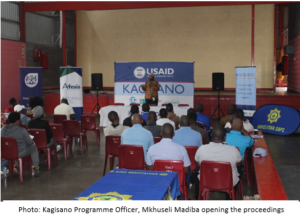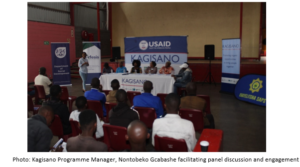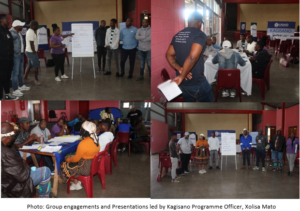
By Mkhuseli Madiba, Xolisa Mato and Nontobeko Gcabashe
The “Breaking the Silence” Men’s Gathering in Khayelitsha was a monumental moment for the Kagisano programme. In a previous iteration of the event, we mainly attracted women and a handful of men. It is thanks to our continuous action orientated approach that we were now finally able to hear the hushed conversations held in the ‘corridors and corners’ of Khayelitsha. We were now able to peel through many layers that underpin the complex and multifaceted factors that are root causes of collective violence in the area.
One of our key focal areas is Gender Based Violence (GBV) against women and children. In the past two years (2022/23) we hosted two 16 Days of Activism campaigns whose communication strategy included publishing campaign statements, driving awareness through social media, hosting events, and putting up placards across Khayelitsha.
During the 16 Days of Activism for No Violence against Women and Children campaign last year, Kagisano partners SAPS and Mpho Ya Basadi, and other stakeholders working with GBV, made a plea that a similar event be hosted in the future. One that would specifically be targeted at men. The aim for this was to educate men on the impacts of GBV in our communities, and to also solicit their opinions on an issue that deeply affects communities across our society.
As a result, on the 16th of March, Afesis hosted a Mens Gathering event at Site B Community Hall, Khayelitsha. The ultimate goal for the “Breaking the Silence” event was to empower men on how to actively combat gender-based violence through education, awareness, and collective action. By fostering a supportive environment for open dialogue and understanding, the aim was to challenge harmful stereotypes and to promote a culture of respect, equality, and non-violence.

In attendance were: Nonceba Family Counselling Centre; the South African Police Service’s Men for Change group; Rape Crisis; Department of Social Development: Metro East Regional Office’s (DSD) GBV Unit; a UCT Lecturer from the African Feminist Studies Department; the No-Excuse Campaign which is part of Father A Nation; and Life Line Western Cape. All these role players were able to engage as panellists, group participants and played an integral part in the dialogue.
One wish we had was that of a high degree of participation from men in the surrounding areas, but that hope was somewhat dampened. Disappointingly, about 30 men eventually attended the events. The sentiments later shared by the panellists, that men do not attend such gatherings, was a bitter pill to swallow. In a country where 10,516 rapes, 1,514 cases of attempted murder, and 14,401 assaults against female victims are mostly perpetrated by men (second-quarter crime statistics for 2023/2024), one would expect men to rise up to the occasion.
However, this was not the case. Instead, this was an indication to the long and difficult road we still have to travel. What was also apparent in the dialogue engagements is that certain gender norms continue to thrive. For example, the women in attendance were of the view that it is important that men talk and not bottle-up their feelings because what eats them inside usually comes out as uncontrolled outbursts of anger and violence. In contrast, the men were adamant that men are not the same as women, they do not talk, talking is for women.
Another talking point was how culture and other ancient traditional practices have contributed to the division between men and women. Here we delved into how these practices have adapted and survived thereby making themselves relevant into modern society.; As far as culture is concerned, of interest was how these archaic practices have normalized the objectification of women and young girls. For example, we touched on a practice called “Ukuthwala” which was carried out for decades. One of the attendees explained how girls as young as 13 years old would be married off to older men in exchange for status and financial gain. This, of course, is a breeding ground for unequal power dynamics to the detriment of the girl, and fertile ground for sexual grooming. Men feel a sense of ownership over their “wives” and simply do as please with them – stripping them of their rights and violating them in the worst manner.
Now, when one looks at modern society, we see the same practices being carried out but in a more “acceptable” manner in transactional relationships. Girls are no longer forced into child marriages. Instead, old men lure them using materials and the promise of a luxurious lifestyle. These exchanges might be regarded as consensual, however, their true nature is that of sexual grooming. We identified the same inequality in power dynamics and a violation of rights common in child marriages. For the participants, this was also an occasion to learn more about what the law says about statutory rape. One question remains, how do we put an end to these practices?
Another topic that caused quite a bit of consternation was the issue of sexual assault where men are the victims. One man at the event said, “According to culture, a men could never be sexually assaulted by their partner. Instead, it is considered as performing their duties as a man”. These divergent views, on who is the victim and perpetrator, made obvious the gulf in perspectives between men and women. However, we were able to agree, violence affects both men and women. Unfortunately for men, it is much harder to come forward and admit victimisation because society has not opened the right channels for them. Which begs the question, how do we get men to talk and break the cycle?
In response, a DSD representative said this requires a multisectoral approach and a Memorandum of Understanding between different departments that would lay out a plan on how to empower men. Currently there is a lack of interlink between departments.
On the other hand, while SAPS was unable to comment on detailed statistics of Intimate Partner Violence (IPV) and contributing factors, they offered some solutions. Equipping SAPS officers from the inside, raising awareness and upskilling men would help in the fight against IPV & GBV. This is something they have already implemented as Mens for Change at SAPS in Khayelitsha.
Community Police Forum (CPF member) and founder of Lukhanyiso Children’s Home, Mam’ Zuki drew our attention to the root causes. She said the fault starts at home with absent parenting, especially with regard to fathers. “This neglect turns into anger at a later stage, and we see these men taking out their anger violently towards their victims”. More insights such as these came out in the group discussion. One teenage boy said, “if only umama can apologise, then I will be good”. These group engagements were quite informative and participants were able to present back to the benefit of everyone.

Some the main points that came out in the group engagements answered the following questions;
1. Factors contributing to IPV & GBV
- Childhood trauma, peer pressure, lack of a positive family structure, and unfaithfulness among partners
- A lack of trust and communication, unequal power dynamics in relationships, grooming of kids by adults, unemployment, financial dependence on a partner, a lack of role models, and lack of an appreciation of what a woman is that takes into account their rights and dignity
- A lack of accountability amongst men and not holding each other accountable, a lack of love, and bottled resentment
2. What are some of the key issues that men in our community are currently facing which are not being addressed. In addition, had such issues been addressed, what change will they bring about?
- When men are abused, they are not listened to or taken seriously, which causes them not to report
- There is a need for awareness campaigns and workshops
- The police services do not extend men the same empathy as they would a woman when they open a GBV case
3. How do you think a safe, conducive, and inclusive space for men to openly share their thoughts, experience, and challenges can be established?
- We need to create more safe spaces for men to talk and share their feelings and thoughts about this issue, like workshops and imbizos
- Build trust among men
- The conversation needs to start at home with parents talking to their children and also involving many stakeholders.
- Forming groups such as men support groups and having victim support units for men
In order to tackle this pandemic more efforts would have to be put in, and more men need to be educated on this issue. When asked about what they hoped to take away from the discussion, men who attended said they wished to be more empowered, equipped and informed about GBV. Another said he hoped to be more knowledgeable about GBV and IPV. One thing was also clear – they would love to have access to other organisations working around this issue.
For us, as a means to pave a way forward on the GBV debacle, we will compile a report collating all the lessons learnt and present it to the National Strategic Plan’s (NSP) Multisectoral structure. This structure was set-up by the presidency as a vehicle to support the fight against GBV.
The NSP aligns with our work around GBV., In the words of Dr. Nkosazana Dlamini-Zuma, Minister in the Presidency for Women, Youth and People with Disabilities: “The National Strategic Plan (NSP) has issued a clear call to action regarding gender-based violence against women and girls (GBVF), emphasising the importance of expanding programming designed to involve men and boys in the battle against this form of violence,”
Overall, events such as “Breaking the Silence are a good starting point. However, they also reveal that there is ample room for improvement. For one, we realised that men do not feel entirely comfortable expressing themselves openly and honestly in the presence of women.
This is an area we need to focus on in future events.